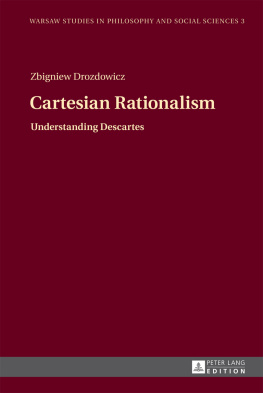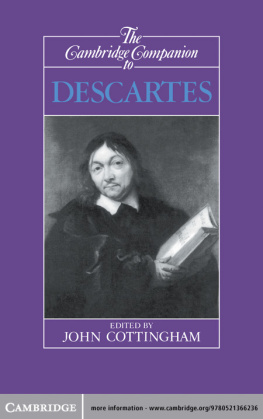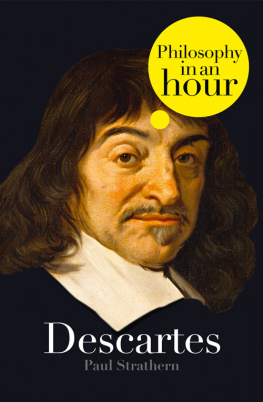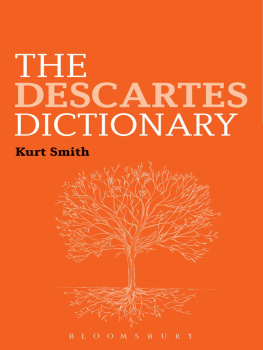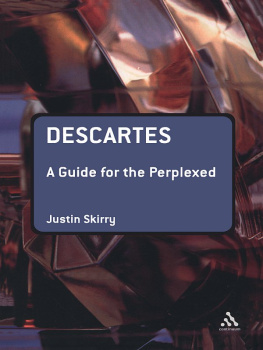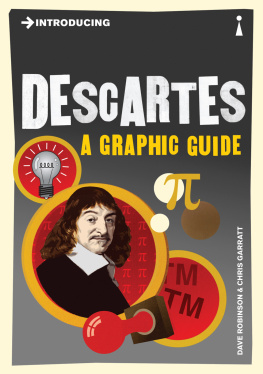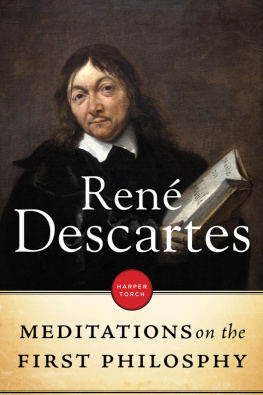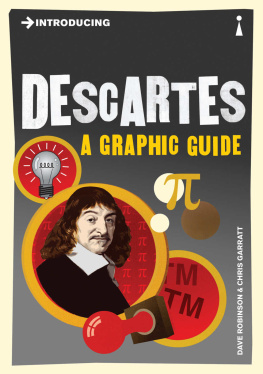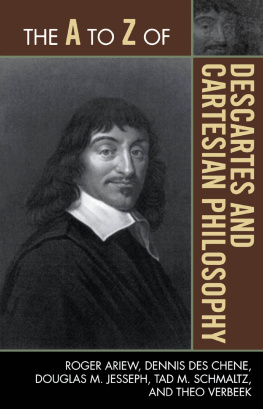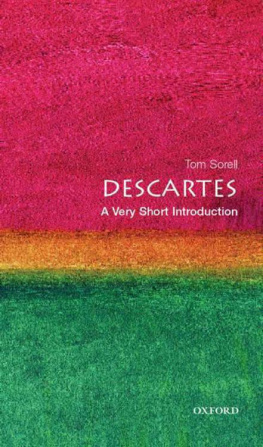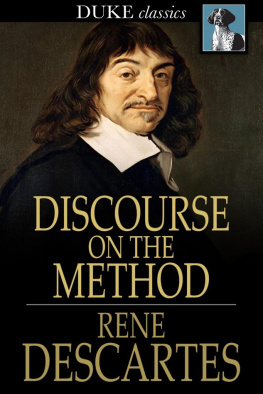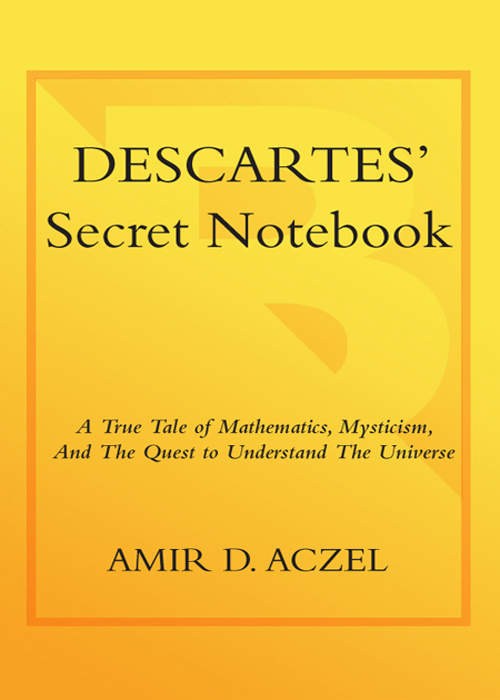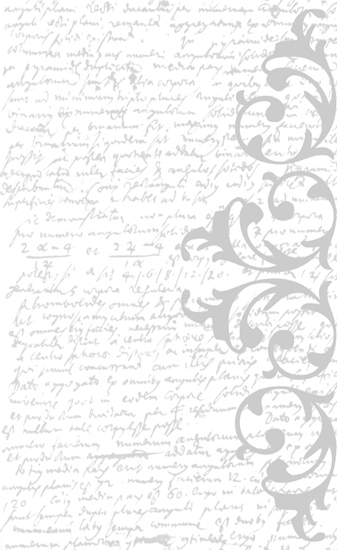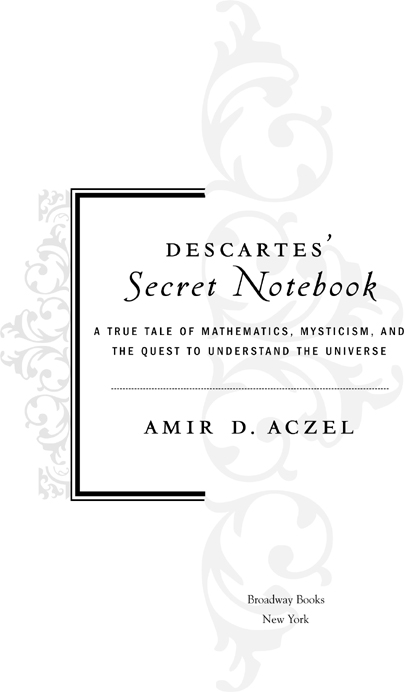ALSO BY AMIR D. ACZEL
I am extremely grateful to the John Simon Guggenheim Memorial Foundation for making me a Fellow of the Foundation. My Guggenheim Fellowship made this book possible, and receiving this award has been the greatest honor in my professional career. I thank the foundation and its officers for believing in me and in this project even before its acceptance by a publisher. My special thanks to Senior Vice President G. Thomas Tanselle for his interest in my work.
I thank the librarians of the Bibliotheque nationale de France in Paris for giving me access to many original manuscripts and documents on Descartes and the mystery of his notebook. Also in Paris, I am indebted to the Institut de France and its librarians for allowing me to use the institute's extensive archives, and to Professor Jean Dercourt, Perpetual Secretary of the French Academy of Sciences.
Many thanks to the Gottfried Wilhelm Leibniz Library in Hanover, Germany, and to its administrator, Birgit Zimny, for making available to me the manuscripts Leibniz copied from Descartes, which held the key to the mystery addressed in this book. My appreciation for the photographic processing work on the Leibniz images performed by Kevin Wool and Boston Photo Imaging.
I am grateful to Professor Jay M. Pasachoff of Williams College for providing me with his image of Kepler's model of the universe, and I thank Wayne G. Hammond of the Chapin Library at Williams College for making this figure available to me.
I want to express my many thanks to Jeff Weeks (www.geometry games.org) for providing me with his images of the Poincare dodecahe-dral space and other geometrical models of the universe, and for explaining to me his work in cosmology.
I thank the Descartes Museum in Descartes, Touraine, and its administrator, Daisy Esposito, for guiding me to a number of important documents on the early life of Rene Descartes. I thank the Protestant Museum in La Rochelle, France, for information on the siege of the city in the seventeenth century.
I am grateful to the photographer Tzeli Hadjidimitriou (www.odoiporikon.com) in Athens, Greece, for her photograph of the temple on the island of Delos.
I wish to express my gratitude to Professor Owen Gingerich and the department of the history of science at Harvard University for appointing me a visiting scholar at the department.
I acknowledge the Center for the Philosophy and History of Science at Boston University, where I spent a year as a Research Fellow while writing this book. My work was aided by a number of people at the center, including Alfred Tauber and Debra Daugherty, and at various branches of the Boston University Library.
My deepest gratitude to my agent and friend, John Taylor (Ike) Williams, of Kneerim and Williams in Boston, for guiding my writing career with so much patience and wisdom.
My heartfelt thanks also to Hope Denekamp of Kneerim and Williams for all her tireless help with this book, and with everything related to publishing.
I am very grateful to Gerald Howard, my editor at Broadway Books in New York, for his clear judgment, knowledge, and guidance in shaping a manuscript into a book, and for always keeping me on the right track in this complex endeavor. I thank Rakesh Satyal for all his work on this project, for his boundless energy, and for his care in making this project a reality.
Many colleagues and friends helped me in the undertaking of researching and writing this book. They include Judith Alvarez-Perreire, Dan Carey, Stephen Gaukroger, Kurt Hawlitschek, Richard Landes, Kenneth Manders, Michael Matthews, Jacob Meskin, Evelyne Patlagean, Arthur Steinberg, and Marina Ville. Thank you, everyone.
My deepest thanks and appreciation to my wife, Debra, for helping me edit and revise the manuscript, for photographic work, and for her many important ideas. This book is dedicated to her.
1:
2:
3:
4:
5:
6:
7:
8:
9:
10:
11:
12:
13:
14:
15:
16:
17:
18:
19:
20:
21:
Introduction
I HELD THE FRAGILE ANCIENT MAN uscript in my hand. I opened it carefully, and read:
PREAMBLES
Fear of God is the beginning of wisdom. The actors, called to the scene, in order to hide their flaming cheeks, don a mask. Like them, when climbing on stage in the theater of the world, where, thus far, I have only been a spectator, I advance masked. At the time of my youth, witnessing ingenious discoveries, I asked myself whether I could invent all on my own, without leaning on the work of others. Henceforth, little by little, I became aware that I was proceeding according to determined rules. Science is like a woman: if faithful, she stays by her husband, she is honored; if she gives herself to everyone, she is degraded.
The manuscript continued further. After a few more pages, I read another fragment of text:
OLYMPICA
November 11, 1620. I began to conceive the foundation of an admirable discovery.
These were the enigmatic words of Rene Descartes (1596-1650). They were never intended for eyes other than his own. But the manuscript I now held in my hands was not written by Descartes. It was a copy of Descartes' secret writings made by none other than Gottfried Wilhelm Leibniz (1646-1716)one of the greatest mathematicians of all time and the man who, only a few years after copying Descartes' notebook in Paris in 1676, would give us the calculus.

The idea for a book about Descartes occurred to me while lost in a snowstorm somewhere in eastern Ontario, hard by the Quebec border, around midnight in early January of 2002. We were on our way back home to Massachusetts from a holiday visit to relatives in Toronto, hoping to spend the last night of our trip in Montreal, when our car got mired in deep snow dropped by a sudden blizzard. I turned off the highway to look for a place to wait out the storm; but after making an unfortunate sequence of turns onto various country roads, I came to the conclusion that I had gotten us completely lost. The visibility was poor, there were no lights in sight, and we had no idea where to turn. I knew that if the fuel ran out, eventually we would start to freeze.


